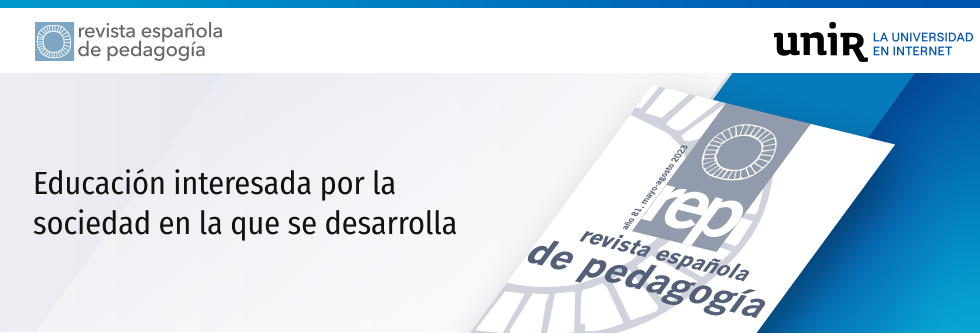Abstract
The concept of socio-educational intervention has been much discussed in the field of education. Nonetheless, and despite its versatility and variety of meanings, it is one of the most commonly used concepts in the fields of school and social education. The aim of this text is twofold: on the one hand it will analyse this term and argue for its usefulness and applicability in our field; on the other hand it will derive from this analysis a whole series of pedagogical principles that can help with the training of teachers and educators and the development of their professional practice. Given the complexity of socio-educational intervention processes, the methodology employed to derive these pedagogical principles will be metaphors. The aim is to collect or create metaphors that enable analysis and reinterpretation of the socio-educational intervention processes that take place within the framework of professional practice. Six metaphors are presented and analysed in the text: 1) the horse and the fountain; 2) socio-educational synapses; 3) the crocodile and the pond; 4) the tightrope walker; 5) the bullet and the moving target; and, finally, 6) signalling beacons. These all allow a novel look at the socio-educational intervention processes used by education professionals. Some of the pedagogical principles developed refer to the sovereignty of the learner in relation to learning, the need to establish links with participants and work together, and the need to establish guidelines to steer the actions of those who work in education and pedagogy, among other principles.
Cite this article as: Úcar, X. (2018). Metáforas de la intervención socioeducativa: implicaciones pedagógicas para la práctica | Metaphors for socio-educational intervention: pedagogical implications for practice. Revista Española de Pedagogía, 76 (270), 209-224 doi: 10.22550/REP76-2-2018-01
Referencias | References
Alinsky, S. (2012). Tratado para radicales. Manual para revolucionarios pragmáticos. Madrid: Traficantes de sueños.
Bauman, Z. (2010). Mundo consumo. Barcelona: Paidós.
Brezinka, W. (2002). Sobre las esperanzas del educador y la imperfección de la pedagogía. revista española de pedagogía, 60 (223), 399-414.
Carballeda, A. J. (2002). La intervención en lo social. Exclusión e integración en los nuevos escenarios sociales. Buenos Aires: Paidós.
Chan, Z. C. Y. (2013). Adolescents’ Views on Families as Metaphors in Hong Kong: Implications for Precounselling Assessment. Children & Society, 27 (2), 104-115.
Claxton, G. (1984). Vivir y aprender. Psicología del desarrollo y del cambio en la vida cotidiana. Madrid: Alianza editorial.
Dewey, J. (2015). Las fuentes de la ciencia de la educación. Lapislatzuli Ed. Eriksson, L. & Markström, A. M. (2003). Interpreting the concept of social pedagogy. In A. Gustavsson, H. Hermansson, & J. Hämäläinen (Eds.), Perspectives and theory in social pedagogy (pp. 9-22). Gothenburg: Bokförlaget Daidalos A. B.
Goofman, E. (2006). Frame Analysis. Los marcos de la experiencia. Madrid: Centro de investigaciones sociológicas. Han, B-C (2015). El aroma del tiempo. Barcelona: Herder.
Ibáñez, T. (2001). Municiones para disidentes. Barcelona: Gedisa.
Jacquard, A. (1984). Inventer l’homme. Paris: Éditions Complexe. Lucio-Villegas, E. (2005). Una reflexión siempre provocadora: ¿Los métodos de intervención son los mismos que los de investigación en la práctica? In C. Mínguez (Ed.), La educación social: discurso, práctica y profesión (pp. 199- 220). Madrid: Dykinson. Morin, E. (1993). El método. La naturaleza de la naturaleza. Madrid: Cátedra.
Moss, C. & Cameron, C. (2011). Social Pedagogy: future directions. In C. Cameron & P. Moss, Social pedagogy and working with children and Young people. When care and education meet (pp. 195-209). London: JKP.
Neuman, A. & Guterman, O. (2017). Metaphors and education: comparison of metaphors for education among parents of children in school and home education. Pedagogy, Culture & Society. doi: 10.1080/14681366.2017.1414868
Saez, J. (1993). La intervención socioeducativa: entre el mito y la realidad. Pedagogía social. Revista interuniversitaria. 8, 89-106.
Sfard, A. (1998). On Two Metaphors for Learning and the Dangers of Choosing Just One. Educational Researcher, 27 (2), 4-13. Sloterdijk, P. (2014). Fiscalidad voluntaria y responsabilidad ciudadana. Madrid: Siruela.
Stephens, P. (2013). Social pedagogy: heart and head. Bremen: EVH/Academicpress GmbH.
Swedberg, R. (2016). El arte de la teoría social. Madrid: Centro de Investigaciones Sociológicas.
Storø, J. (2013). Practical social pedagogy. Theories, values and tools for working with children and Young people. Bristol: The Policy Press.
Taylor, P. (2008). Where crocodiles find their power: learning and teaching participation for community development. Community Development Journal, 43 (3), 358-370.
Úcar, X. (2015). L’aprenentatge informal i la pedagogia dels canvis de fase. Fòrum. Revista d’organització i gestió educativa. January-April. Barcelona: Graò.
Úcar, X. (2016). Pedagogía de la elección. Barcelona: UOC/Oberta Publishing.
Citación recomendada | Recommended citation
Úcar, X.
(2018)
.
Metaphors for socio-educational intervention: pedagogical implications for practice.
Revista Española de Pedagogía, 76(270).
https://www.revistadepedagogia.org/rep/vol76/iss270/11
Licencia Creative Commons | Creative Commons License
Esta obra está bajo una licencia internacional Creative Commons Atribución-NoComercial 4.0.
This work is licensed under a Creative Commons Attribution-NonCommercial 4.0 International License
Palabras clave | Keywords
communityeducation, educationalprinciples, intervention






